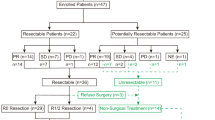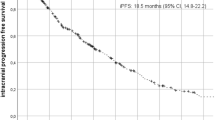Abstract
Few effective therapeutic options are currently available for the treatment of non-small cell lung cancer (NSCLC) with brain metastases (BM). Recent evidence shows that NSCLC patients with BMs respond well to afatinib, but little is known about the underlying mechanisms. In this study, we evaluated the efficacy of afatinib in treatment of BMs in mice and investigated whether afatinib could actively penetrate the brain-blood barrier and bind to its target. NSCLC BM model was established in nude mice by intracerebral injection of PC-9.luc cells. The tumors were measured weekly using in vivo quantitative bioluminescence. The mice are administrated afatinib (15, 30 mg·kg−1·d−1, ig) for 14 d. The antitumor efficacy of afatinib was determined by tumor growth inhibition (TGI), which was calculated as [1−(change of tumor volume in treatment group/control group)×100]. Pharmacokinetic characteristics were measure in mice receiving a single dose of afatinib (30 mg/kg, ig). Pharmacodynamics of afatinib was also assessed by detecting the expression of pEGFR (Tyr1068) in brain tumor foci using immunohistochemistry. Administration of afatinib (15, 30 mg·kg−1·d−1) dose-dependently inhibited PC-9 tumor growth in the brain with a TGI of 90.2% and 105%, respectively, on d 14. After administration of afatinib (30 mg/kg), the plasma concentration of afatinib was 91.4±31.2 nmol/L at 0.5 h, reached a peak (417.1±119.9 nmol/L) at 1 h, and was still detected after 24 h. The cerebrospinal fluid (CSF) concentrations followed a similar pattern. The T1/2 values of afatinib in plasma and CSF were 5.0 and 3.7 h, respectively. The AUC(0–24 h) values for plasma and CSF were 2375.5 and 29.1 nmol/h, respectively. The plasma and CSF concentrations were correlated (r=0.844, P<0.01). Pharmacodynamics study showed that the expression levels of pEGFR were reduced by 90% 1 h after afatinib administration. The Emax was 86.5%, and the EC50 was 0.26 nmol/L. A positive correlation between CSF concentrations and pEGFR modulation was revealed. Afatinib penetrates the BBB in NSCLC BM mice and contributes to the brain tumor response. The CSF exposure level is correlated with the plasma level, which in turn is correlated with the modulation of pEGFR in the tumor tissues. The results support for the potential application of afatinib in NSCLC patients with BMs.
Similar content being viewed by others
Log in or create a free account to read this content
Gain free access to this article, as well as selected content from this journal and more on nature.com
or
Change history
09 April 2025
A Correction to this paper has been published: https://doi.org/10.1038/s41401-025-01542-6
References
Gavrilovic IT, Posner JB . Brain metastases: epidemiology and pathophysiology. J Neurooncol 2005; 75: 5–14.
Mujoomdar A, Austin JH, Malhotra R, Powell CA, Pearson GD, Shiau MC, et al. Clinical predictors of metastatic disease to the brain from non-small cell lung carcinoma: primary tumor size, cell type, and lymph node metastases. Radiology 2007; 242: 882–8.
Kawabe T, Phi JH, Yamamoto M, Kim DG, Barfod BE, Urakawa Y . Treatment of brain metastasis from lung cancer. Prog Neurol Surg 2012; 25: 148–55.
Li D, Ambrogio L, Shimamura T, Kubo S, Takahashi M, Chirieac LR, et al. BIBW2992, an irreversible EGFR/HER2 inhibitor highly effective in preclinical lung cancer models. Oncogene 2008; 27: 4702–11.
Schuler M, Wu YL, Hirsh V, O'Byrne K, Yamamoto N, Mok T, et al. First-line afatinib versus chemotherapy in patients with non-small cell lung cancer and common epidermal growth factor receptor gene mutations and brain metastases. J Thorac Oncol 2016; 11: 380–90.
Hoffknecht P, Tufman A, Wehler T, Pelzer T, Wiewrodt R, Schutz M, et al. Efficacy of the irreversible ErbB family blocker afatinib in epidermal growth factor receptor (EGFR) tyrosine kinase inhibitor (TKI)-pretreated non-small-cell lung cancer patients with brain metastases or leptomeningeal disease. J Thorac Oncol 2015; 10: 156–63.
Clark AJ, Safaee M, Oh T, Ivan ME, Parimi V, Hashizume R, et al. Stable luciferase expression does not alter immunologic or in vivo growth properties of GL261 murine glioma cells. J Transl Med 2014; 12: 345.
Zeng Q, Wang J, Cheng Z, Chen K, Johnstrom P, Varnas K, et al. Discovery and evaluation of clinical candidate AZD3759, a potent, oral active, central nervous system-penetrant, epidermal growth factor receptor tyrosine kinase inhibitor. J Med Chem 2015; 58: 8200–15.
Fouad M, Helvenstein M, Blankert B . Ultra high performance liquid chromatography method for the determination of two recently FDA approved TKIs in human plasma using diode array detection. J Anal Methods Chem 2015; 2015: 215128.
Chen Y, Wang M, Zhong W, Zhao J . Pharmacokinetic and pharmacodynamic study of Gefitinib in a mouse model of non-small-cell lung carcinoma with brain metastasis. Lung Cancer 2013; 82: 313–8.
Haughton ME, Chan MD, Watabe K, Bonomi M, Debinski W, Lesser GJ, et al. Treatment of brain metastases of lung cancer in the era of precision medicine. Front Biosci (Elite Ed) 2016; 8: 219–32.
Nussbaum ES, Djalilian HR, Cho KH, Hall WA . Brain metastases. Histology, multiplicity, surgery, and survival. Cancer 1996; 78: 1781–8.
Saito N, Hatori T, Murata N, Zhang ZA, Nonaka H, Aoki K, et al. Comparison of metastatic brain tumour models using three different methods: the morphological role of the pia mater. Int J Exp Pathol 2008; 89: 38–44.
Chua JY, Pendharkar AV, Wang N, Choi R, Andres RH, Gaeta X, et al. Intra-arterial injection of neural stem cells using a microneedle technique does not cause microembolic strokes. J Cereb Blood Flow Metab 2011; 31: 1263–71.
Do J, Foster D, Renier C, Vogel H, Rosenblum S, Doyle TC, et al. Ex vivo Evans blue assessment of the blood brain barrier in three breast cancer brain metastasis models. Breast Cancer Res Treat 2014; 144: 93–101.
Cross DA, Ashton SE, Ghiorghiu S, Eberlein C, Nebhan CA, Spitzler PJ, et al. AZD9291, an irreversible EGFR TKI, overcomes T790M-mediated resistance to EGFR inhibitors in lung cancer. Cancer Discov 2014; 4: 1046–61.
Wiebe S, Schnell D, Kulzer R, Gansser D, Weber A, Wallenstein G, et al. Influence of renal impairment on the pharmacokinetics of afatinib: an open-label, single-dose study. Eur J Drug Metab Pharmacokinet 2016. doi: 10.1007/s13318-016-0359-9.
Schnell D, Buschke S, Fuchs H, Gansser D, Goeldner RG, Uttenreuther-Fischer M, et al. Pharmacokinetics of afatinib in subjects with mild or moderate hepatic impairment. Cancer Chemother Pharmacol 2014; 74: 267–75.
Wind S, Schnell D, Ebner T, Freiwald M, Stopfer P . Clinical pharmacokinetics and pharmacodynamics of afatinib. Clin Pharmacokinet 2016. doi: 10.1007/s40262-016-0440-1.
Zhang S, Zheng X, Huang H, Wu K, Wang B, Chen X, et al. Afatinib increases sensitivity to radiation in non-small cell lung cancer cells with acquired EGFR T790M mutation. Oncotarget 2015; 6: 5832–45.
Zhang J, Yu J, Sun X, Meng X . Epidermal growth factor receptor tyrosine kinase inhibitors in the treatment of central nerve system metastases from non-small cell lung cancer. Cancer Lett 2014; 351: 6–12.
Zhao J, Chen M, Zhong W, Zhang L, Li L, Xiao Y, et al. Cerebrospinal fluid concentrations of gefitinib in patients with lung adenocarcinoma. Clin Lung Cancer 2013; 14: 188–93.
Togashi Y, Masago K, Masuda S, Mizuno T, Fukudo M, Ikemi Y, et al. Cerebrospinal fluid concentration of gefitinib and erlotinib in patients with non-small cell lung cancer. Cancer Chemother Pharmacol 2012; 70: 399–405.
Deng Y, Feng W, Wu J, Chen Z, Tang Y, Zhang H, et al. The concentration of erlotinib in the cerebrospinal fluid of patients with brain metastasis from non-small-cell lung cancer. Mol Clin Oncol 2014; 2: 116–20.
Soria JC, Felip E, Cobo M, Lu S, Syrigos K, Lee KH, et al. Afatinib versus erlotinib as second-line treatment of patients with advanced squamous cell carcinoma of the lung (LUX-Lung 8): an open-label randomised controlled phase 3 trial. Lancet Oncol 2015; 16: 897–907.
Schuler M, Fischer JR, Grohe C, Gutz S, Thomas M, Kimmich M, et al. Experience with afatinib in patients with non-small cell lung cancer progressing after clinical benefit from gefitinib and erlotinib. Oncologist 2014; 19: 1100–9.
Zeng YD, Zhang L, Liao H, Liang Y, Xu F, Liu JL, et al. Gefitinib alone or with concomitant whole brain radiotherapy for patients with brain metastasis from non-small-cell lung cancer: a retrospective study. Asian Pac J Cancer Prev 2012; 13: 909–14.
Welsh JW, Komaki R, Amini A, Munsell MF, Unger W, Allen PK, et al. Phase II trial of erlotinib plus concurrent whole-brain radiation therapy for patients with brain metastases from non-small-cell lung cancer. J Clin Oncol 2013; 31: 895–902.
Acknowledgements
This work was supported by funding from the National Natural Science Foundation of China (81272611), the Zhejiang Provincial Foundation of Natural Science (LZ13H60001) and the Major Science and Technology Innovation Project of Hangzhou (20112312A01) to Sheng-lin MA and the Zhejiang Medical Science Foundation, China (2014KYA178), the Hangzhou Key Disease and Discipline Foundation, China (20140733Q15), and the Zhejiang Provincial Natural Science Foundation of China (LY15H160010) to Shi-rong ZHANG.
Author information
Authors and Affiliations
Corresponding authors
Additional information
Supplementary information is available at the website of Acta Pharmacologica Sinica.
Supplementary information
Supplementary Figure S1
A. Characteristics of established PC-9.luc subline cells comparing to PC-9 cells. (JPG 104 kb)
Supplementary Figure S2
A. Representative image showing the radiance the first day after tumor cells injection; B. Representative image showing the radiance 14 days after tumor cells injection (JPG 841 kb)
Rights and permissions
About this article
Cite this article
Zhang, Sr., Zhu, Lc., Jiang, Yp. et al. Efficacy of afatinib, an irreversible ErbB family blocker, in the treatment of intracerebral metastases of non-small cell lung cancer in mice. Acta Pharmacol Sin 38, 233–240 (2017). https://doi.org/10.1038/aps.2016.107
Received:
Accepted:
Published:
Issue date:
DOI: https://doi.org/10.1038/aps.2016.107
Keywords
This article is cited by
-
The multi-kinase inhibitor afatinib serves as a novel candidate for the treatment of human uveal melanoma
Cellular Oncology (2022)
-
Orthotopic model of lung cancer: isolation of bone micro-metastases after tumor escape from Osimertinib treatment
BMC Cancer (2021)
-
Afatinib and radiotherapy, with or without temozolomide, in patients with newly diagnosed glioblastoma: results of a phase I trial
Journal of Neuro-Oncology (2021)
-
Afatinib as First-Line Treatment in Asian Patients with EGFR Mutation-Positive NSCLC: A Narrative Review of Real-World Evidence
Advances in Therapy (2021)
-
Overcoming the acquired resistance to gefitinib in lung cancer brain metastasis in vitro and in vivo
Archives of Toxicology (2021)



